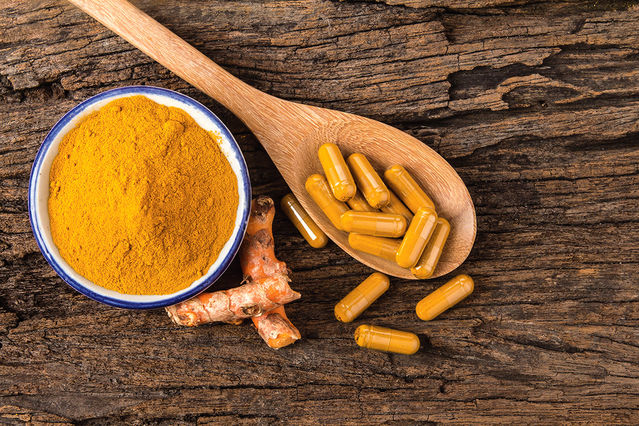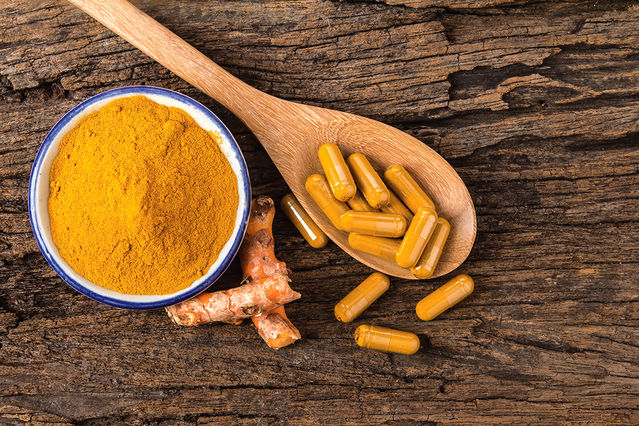Learn about brain health and nootropics to boost brain function
A Nimble Nutrient


One thing that enables the nutrients in foods to be so important to health is the power of repetition. For example, numerous phytochemicals exist in many fruits and vegetables, and consumed daily, even in small amounts, they can provide an outsize benefit to the mind and body. You’ve probably heard of carotenes, linked to eye health, and resveratrol, thought to be important for longevity.
Consider curcumin, the vivid yellow-orange substance that gives the root turmeric its distinctive color. A member of the ginger family, turmeric has long been a staple of Indian culture, consumed in curries or prescribed as a natural remedy. Turmeric contains just 3 to 5 percent curcumin, but even such a low concentration of the nutrient, consumed regularly, can address ailments from inflammation and depression to cancer and dementia.
Curcumin is a polyphenol, one of a group of chemicals that occur naturally in plants to ward off disease or destruction—from insects or solar radiation—and aid recovery from such threats. Consumed in foods, polyphenols remain bioactive, delivering similar perks to their new human hosts.
Although curcumin has long been used in traditional medicines, recent clinical trials have given it the stamp of scientific approval. Studies show that curcumin stimulates the release of proteins called cytokines that calm and heal inflammation. Chronic inflammation plays a role in many illnesses, including cardiovascular disease, diabetes, obesity, dementia, and depression.
“There’s a lot of evidence that people with depression have greater levels of inflammation and oxidative stress,” says psychologist Adrian Lopresti, a senior researcher at Murdoch University in Australia who has conducted clinical trials of curcumin as a treatment for depression. “That may be how curcumin works to improve mental health.”
Studies show that curcumin also guards the aging brain, shielding against cognitive decline and protecting against proteins linked to dementia. Rural India has one of the lowest rates of Alzheimer’s disease, which may be a clue to curcumin’s protective role.
More recently, researchers have investigated curcumin’s role in generating and maintaining mitochondria, the energy-producing organelles in cells that are especially critical for brain power. Studies show that curcumin contributes to the structural integrity of mitochondria and their function. Mitochondrial dysfunction is strongly implicated in such neurodegenerative conditions as Alzheimer's disease.
In Australia, Andrew Scholey, the director of the Centre for Human Psychopharmacology at Swinburne University in Melbourne, previously found that daily consumption of a supplement containing 80 mg of curcumin boosted memory and mood after four weeks. Now his team has extended the findings by observing its influence over a longer period.
The researchers gave 80 healthy adults age 50 to 80 either curcumin or a placebo once a day for three months. Participants completed questionnaires that measured their emotional state and cognitive performance when the study began, after four weeks, and again after 12 weeks.
At the end of the study, those who consumed the curcumin performed significantly better on three tasks of “working memory” than those who received a placebo. Working memory reflects the ability to hold information in the mind for ready retrieval—like remembering whose number to dial after picking up the phone to make a call.
Curcumin also boosted participants’ moods, although the duration of the effect varied. Those who consumed curcumin reported reductions in anxiety, anger, and confusion after four weeks. But after 12 weeks of taking the supplement, the benefit disappeared.
Curcumin’s influence on fatigue was more sustained; the curcumin group reported less exhaustion than the placebo group after both four weeks and 12 weeks. The differences in the duration of effects suggest that curcumin works through multiple mechanisms, Scholey says.
Memory and mood are consistently the two most pressing concerns for his elderly patients, Scholey reports. As people get older, he finds, they wish for stronger memory and more energy. A daily dose of curcumin may be enough to make a difference on everyday tasks. Reaction times on memory tasks may improve by only small margins—milliseconds—but the moments gained can make a difference. “Ten or 15 milliseconds doesn’t mean that much to most people,” Scholey says. “But if you’re driving a car, it could save your life.”
Benefits to the Body
- Calms inflammation
- Limits oxidative stress
- Curbs cognitive decline
- Protects against depression
- Fights certain cancers
- Combats digestive problems
- Lightens fatigue
Quirks of Curcumin
- As a pigment conferring the vivid color of turmeric, curcumin has been used historically to dye thread and fabric.
- Plants rely on polyphenols like curcumin to defend against the effects of drought and other environmental threats.
- Ayurvedic medicine, the ancient Indian approach to healing, incorporates curcumin as a remedy for colds, smallpox, and shingles, among other ailments.
- The first study of curcumin, as a therapeutic agent in the treatment of biliary disease, was published in 1937.
- Curcumin naturally has poor bioavailability; researchers are seeking ways to manipulate the molecule for better absorption by the body.
- To soothe inflammation, curcumin releases proteins called cytokines.
- Impaired blood flow plays a role in cognitive aging; studies show curcumin improves circulation.
- Curcumin helps generate and boost the function of mitochondria and degrades failing mitochondria.
- Curcumin helps to heal wounds and to reduce pain, inflammation, and scarring created by burns; it is more effective applied as a gel than taken as a pill.
- Recent studies suggest that curcumin may influence the composition of the microbiome, delivering cognitive benefits by yet another route, the gut-brain axis.
Click here to view full article